Against the Odds: Stories from women in Thailand during COVID19
Date:
Authors: Vipunjit Ketunuti and Saranya Chittangwong
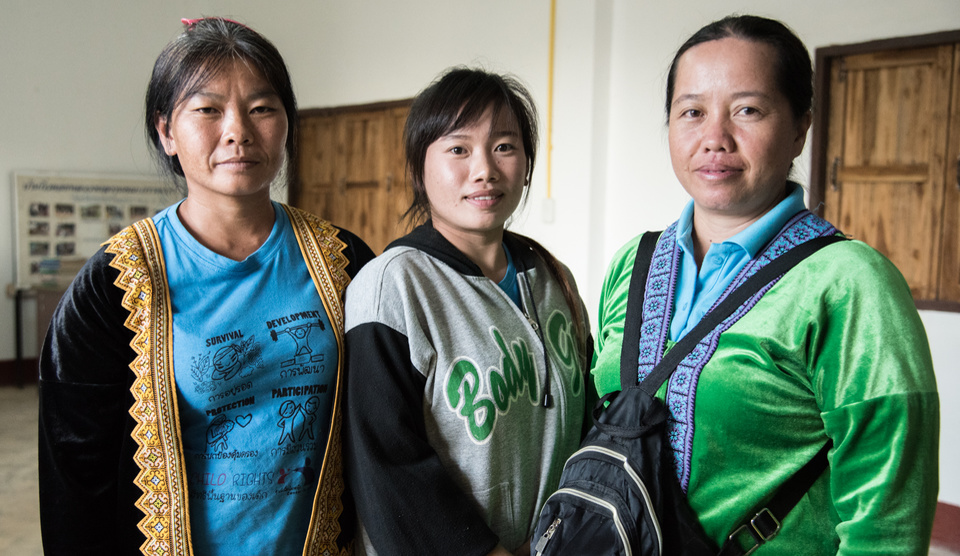
COVID-19 has impacted the limited progress that has been made on gender equality and women’s rights. The pandemic poses a serious threat to women’s engagement in economic activities which leads to devastating social and economic consequences for women and girls which includes unemployment, increased unpaid care work and limited access to services. Although COVID-19 is non-discriminatory, vulnerable groups namely women employed in informal sector, women in conflict affected areas, women in rural areas, women migrants and ethnic groups tend to suffer the most from limited movements and reduction of incomes. It is for this reason that addressing the needs of vulnerable groups is a matter of priority and urgency.
In Thailand, there are 3,157 confirmed cases (1,418 women and 1,740 men).[1] Various vulnerable groups are faced with different social and economic impacts. Social distancing and lockdown measures may not be realistic options for some vulnerable groups. While the economic and social impacts on society are severe, they are more so for women, especially those in the informal economy such as market vendors and agriculture with lack of social security. According to the Informal Employment Survey by the National Statistical Office in 2019, there were approximately 20 million workers in the informal sector in Thailand, of which, 9 million or 44 percent are women.[2] Jobs in the informal sector include vendors, shop assistants, massage therapists, domestic workers and caregivers which rely heavily on daily income streams. Many of them are facing a reduction of income, no income or unemployment, and have been left with limited eligibility to social security schemes and stimulus packages by the Government.
Women typically shoulder a greater burden of care. Women also have a greater responsibility with domestic tasks as they tend to live with other vulnerable groups including children, elderly, people with disabilities and those who are bedridden. During the COVID-19 pandemic, women are disproportionately bearing the burden of providing unpaid care and domestic work. 26% of young women reported an increase in unpaid adult care (compared to 16% young men), and 41% of young women reported increases in unpaid childcare (compared to 28% of young men). Single mothers may be forced to spend less time with their children, as they cannot share the burden of domestic work.[3]
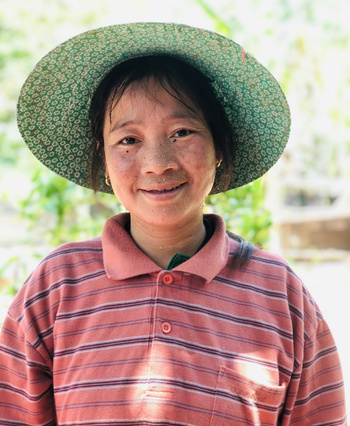
Amidst such uncertainty causing social and economic impacts on personal, community and national levels, women in communities are taking leads in building and ensuring resilience in communities through different roles including community health workers, community leaders or community members.
In hard-to-reach Chiang Khong District of Chiang Rai Province most of the population are ethnic minorities and migrants. Without Thai nationality, many are facing difficulty in accessing support by the government. In-thong Kammun, aged 31, from Lao PDR is a struggling migrant. After her husband had an accident making him unable to work, she became a head of household working as a cleaner at a local temple in Chiang Khong earning 200-300 baht per day. “Due to COVID-19, I lost my job as there was no tourists coming to the temple due to lockdown measures and border closures.” With a lower skill set, education level and non-Thai national status, In-thong is struggling to find work during this difficult time. She works odd jobs and saves money by growing vegetables as a way to support her family and become more self-reliant.
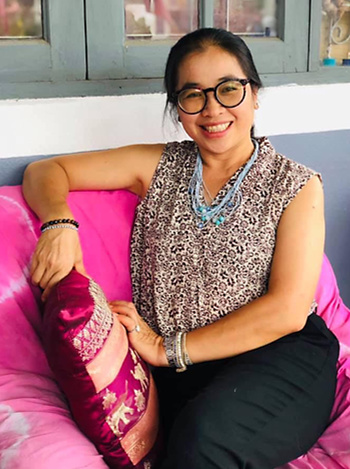
Nunnaree Luangmoi is the Founder and Director of the Center for Girls, a grassroots non-profit organization based in Chiang Khong, Chiang Rai Province, working to protect the rights of women, children, and vulnerable people through sustainable, community-based projects to empower people in the community. Nunnaree has provided emergency support for In-thong, her family and vulnerable women in communities. She stresses that “economic empowerment is essential for the prevention of violence against women.” This increased knowledge base and improved skill sets provides financial stability for women and their families.
UN Women joins hand with the Center for Girls in empowering women in remote communities through capacity building on prevention of violence against women and promotion of gender responsive services to enhance community mechanisms in providing support and protection for women from all forms of violence. This support is primarily through economic empowerment which will enhance opportunities for self-reliance and equality among women in communities.
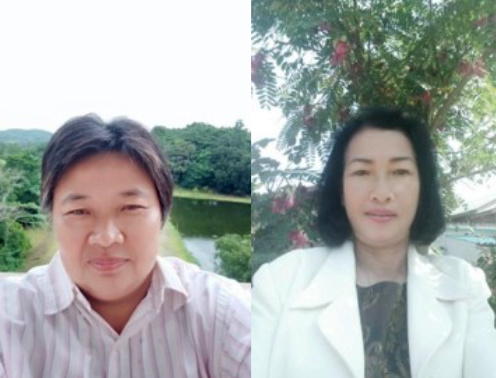
In Phayao Province, many women work in informal employment. Poonsri and Wattana work at local massage shops and have been affected directly by COVID-19. They have lost their income of 200-400 Baht per day due to complete closure of the business for the past two months and have also faced difficulties in accessing timely government support.
From UN Women’s outreach to women in the informal sector throughout Thailand, we have seen that women are facing up to 80% reduction of income. In order to cope with the impact of COVID-19, many women in the informal sector have changed their way of living to earn money. Wattana is selling cold drinks, but is struggling as not many people leave their houses due to social distancing and lockdown measures. She had to sell some of her belongings as there is no other way to earn income. She now grows her own vegetables to cut down expenses on food. The negative impacts of COVID-19 show the importance of self-resilience through preparedness and saving for emergency. Poonsri is now allocating a plot for home grown vegetables for food security for her family.
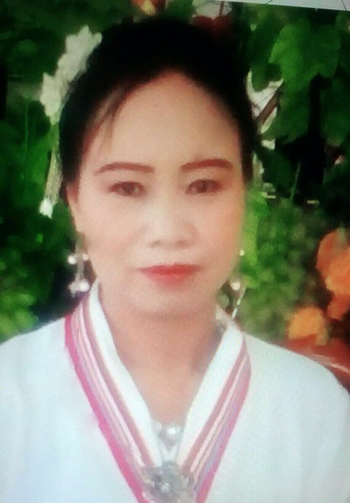
Sakhon sews bags for a living and she has also been affected by COVID-19. There have been no orders from factories. Suddenly, with no income and social protection, Sakhon is struggling to take care of her family of five while taking up an important role serving her community. As a community leader, community health worker and community labour volunteer, Sakhon actively responds and reaches out to community members for COVID-19 prevention. She works with other local community leaders, local authorities and community health workers on planning and monitoring COVID-19 in her community. She advocates the importance of self-reliance and preparedness for emergency. Growing vegetables and farming have helped to survive during lockdown measures and economic uncertainties. Realising the emergency supports from the Government is only a short-term relief, it is important to engage community members to take part in long-term and sustainable resilience.
Sakhon is now working with local community leaders to distribute vegetable seeds to encourage community members to increase self-reliance and food security. She is also coordinating with local vocational training centers in conducting training on sewing and extending networks of women in informal sector on economic empowerment. UN Women supports local women’s groups to produce at least 10,000 face masks to vulnerable groups to generate incomes and to improve community livelihoods, and at the same time to ensure that women and other vulnerable groups are well protected during COVID-19. Sakhon and her network of women in the informal sector produced up to 5,000 masks which were distributed to vulnerable women and children in remote communities.
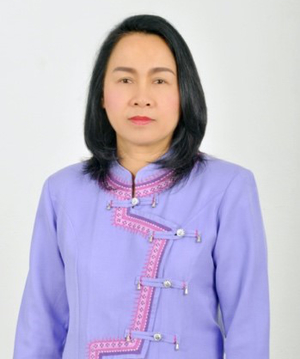
Daonapa, a women’s community leader from the same area confirmed that rural communities are more resilient than urban communities in terms of food security and community participation. During such difficulties when many are faced with no income, it is seen that families with available homegrown products are struggling less than others who must buy food to survive. However, this does not apply to women in rural communities who do not have ownership of land.
Amidst these difficulties COVID-19 has shown some positive trends. “Women in communities are supporting one another through their roles as community leaders and community health volunteers reaching out to women and families in need”. Family members have more time together contributing to domestic and care work. This is teaching communities an important lesson to be resilient and to adapt to a “new normal” way of life that comes with challenges and uncertainties. As cash from community saving programmes and government stimulus packages can only provide short-term relief.
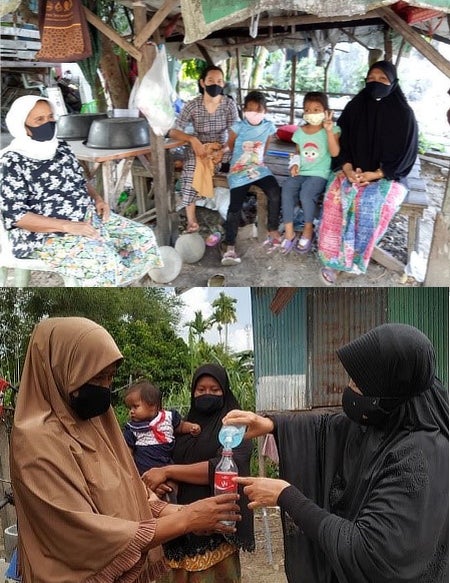
In the Southern Border Provinces of Thailand where a prolonged violent conflict has taken place, there have been higher cases of COVID-19 among Thai Muslims returning from attending religious events in neighbouring countries. Despite the fact that the Patani Malay National Revolutionary Front (BRN) announced a ceasefire in early April in response to COVID-19 to create a safer and more suitable environment for health care service providers and aid agencies, the Government’s preventive measures including self-isolation, inter-provincial travel and lockdown measures have resulted in restricted movements and concerns with food security. This is because women cannot leave their homes and travel to local markets located outside their communities while local producers cannot deliver food and other supplies to those communities. Women in this area face an increased disadvantage due to limited access to information and education through internet and technology.
UN Women has reached out to at least 3,000 vulnerable women in 9 villages in hard-to-reach communities through local civil society groups to provide basic items and raise awareness on gender-based and domestic violence during COVID-19. Local women and youth groups also set up small funds for obtaining dry foods for vulnerable groups including elderly, unemployed and quarantined; and disseminates information on COVID-19 in the Malayu language through social media. To ensure food security in remote communities, local women’s groups (Muslims and Buddhists) set up “surviving kitchen” to prepare hot food and dry food to be distributed to vulnerable groups.
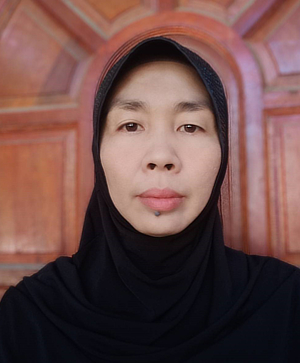
Supatra, Chiang Rai born, living in Pattani for more than 20 years, is the leader of a women’s sewing group called Sayung, which produces bags and products from patee, a traditional Southern fabric. When she first arrived in Pattani, she could not speak “Yawi” (a dialect of Malay) while local people who are ethnic Malays did not speak much Thai. She became an intermediary between locals and authorities. Equipped with skills in sewing, Supatra taught local Muslim women basic sewing skills. The group grew bigger, leading to the forming of Sayung in 2010. Sayung is One Tambon One Product (OTOP) registered and has received supports from local government agencies.
Sayung has been affected by COVID-19 as OTOP roadshows and orders have been put on hold or cancelled due to business and border closure resulting in no income for group members. During the COVID-19 pandemic, family members return home from other provinces or Malaysia and children stay at home as schools are closed. Families are faced with increased expenses with little or no income. To cope with the situation, Supatra sold some gold jewelry that she had saved in order to support her family. Some women have used their savings while they are struggling during COVID-19. Although fasting during Ramadan reduced daily cost of living, women are faced with increasing household expenses after Ramadan during COVID-19. “We have to help ourselves before asking for help.” Says Supatra as Sayung group members report saving and increased self-reliance as they cannot rely on one source of income.
UN Women’s COVID-19 response in the southern border provinces includes; improving livelihoods of local women’s groups and increasing social cohesion in communities through women’s leaders/groups using online channels and community radio while distributing basic items and health supplies. During COVID-19, Sayung has produced more than 5,500 face masks for UN Women which were distributed to vulnerable women and communities in the southern border provinces. With this support, Sayung group members have earned much needed income during COVID-19 while women in rural and hard-to-reach communities have better access to personal protective equipment.
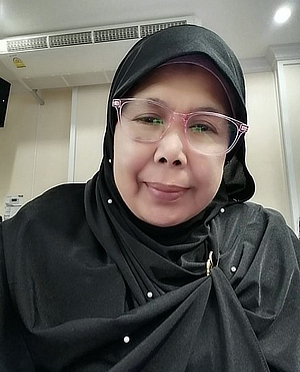
Phanyawadee works for Civic Women for Peace, a local women’s group in Songkhla, Yala, Pattani and Narathiwat. This group is working on providing services to women and children in the Southern Border Provinces and advocating on gender responsive peace building approaches to public policies. Due to COVID-19, projects have not been implemented due to lack of funding and lockdown measures. During the pandemic, Phanyawadee is actively engaged in providing emergency relief, community outreach and home visits together with her network of community health workers and network women’s organizations.
COVID-19 has affected community members working in different sectors such as fishermen motorbike taxi, food vendors and factory workers. During this difficult time, Phanyawadee remains positive and active. She has started making salad dressing and has sold it online. This project has long been on her mind, but her busy schedule did not give her time to make it happen until now.
Support from the government only provides short-term relief and might not reach vulnerable groups in some areas. “During COVID-19, people find generosity within communities. People help each other, look after each other to get through this together.” Phanyawadee coordinates with her network to start a “survival kitchen” to cook fresh food for community members by buying fresh seafood from local fishermen who have lost income as restaurants were closed. Through her network, freshly cooked meals were distributed to people in need in Pattani, Yala and Narathiwat.
During COVID-19, migrant workers face various risks, including restrictive migration policies, insecure and unfair forms of employment, harsh working conditions, language barriers, overcrowded living conditions, racism, xenophobia, limited access to rights and welfare, and undervaluation of their contribution to social and economic development. Non-Thai population including migrant workers and their families are facing barriers to COVID-19 specific hygiene and sanitation requirements including the cost and access to personal protective equipment (PPE) in addition to insufficient income as a result of unemployment and reduced working hours. With limited income, some migrants cannot afford rent forcing them to live together in closely packed units making it difficult for them to comply with social distancing, thus putting them at a larger risk of contracting COVID-19.

Migrants especially migrant workers in informal sector lack social protection and support from the Government. They rely heavily on their networks and non-governmental agencies. They are facing a dilemma as they cannot go back home due to border closures.
While many migrant workers lost their jobs, Irene, a domestic worker from Myanmar managed to keep her job during COVID-19. However, she is facing different challenges.
“With everyone staying at home, I work longer hours with more tasks from my employer without extra or overtime pay.”
She remains positive during this difficult time and is determined to advocate for fair employment for domestic workers. Migrant domestic workers are at an increased risk of labour exploitation with extended working hours and increased workloads. Most of them work alone in private households limiting their access to information and measures to seek help.
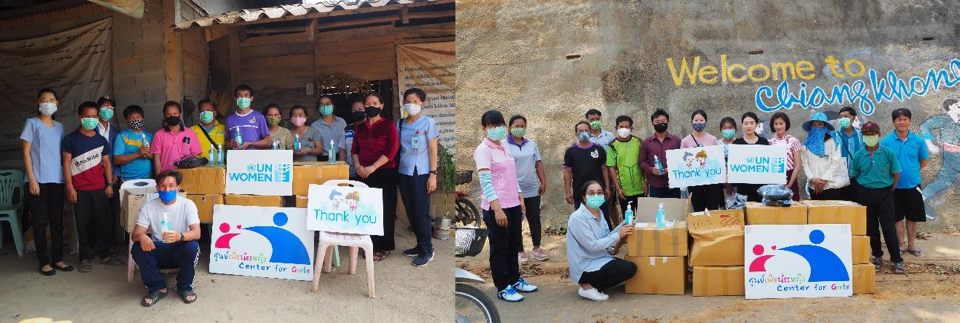
UN Women conducted the rapid assessment survey in April-May 2020 with at least 3,000 people in Thailand to understand the impact of COVID-19 on women. Through the support from UN Women National Committee Australia and Swedish International Development Cooperation Agency (SIDA), UN Women in Thailand:
- reached out to at least 10,000 vulnerable women throughout the country to provide necessary hygiene supplies and to raise awareness of gender-based violence (GBV), violence against women (VAW), social cohesion and COVID-19. Informational materials were disseminated or broadcasted through community radio or community outreach by women leaders in local dialects;
- designed economic empowerment and livelihoods improvement schemes for women who have been directly and indirectly affected by COVID-19 including producing hygiene masks or basic supplies by women in local communities; and
- enhanced capacities of local women through knowledge and skill transfer using innovative online platforms.
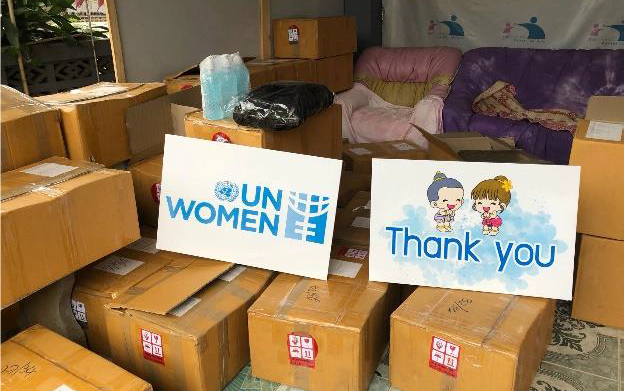
[1] Department of Disease Control, Ministry of Public Health, as of 24 June 2020, https://covid19.ddc.moph.go.th/
[2] ‘The Informal Employment Survey, 2019’, the National Statistical Office.
[3] The findings are based on the rapid assessment on COVID-19 impact conducted by UN Women. There are 2,804 responses in Thailand received as of 12 May 2020.